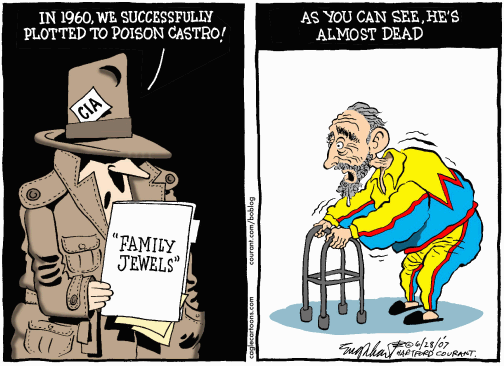Search
Recent comments
- mossad.....
13 hours 20 min ago - palantir...
14 hours 31 min ago - reckoning....
14 hours 56 min ago - RBA BS...
15 hours 27 min ago - clintons to testify....
15 hours 32 min ago - all in it.....
19 hours 52 min ago - friends for peace.....
22 hours 29 min ago - growing.....
22 hours 39 min ago - the epstein sewer....
1 day 9 hours ago - not ready?....
1 day 10 hours ago
Democracy Links
Member's Off-site Blogs
same old sopranos .....

‘The CIA worked with two of America’s top Mafia mobsters in a botched attempt to assassinate the Cuban President Fidel Castro with poisoned pills, according to previously classified documents released by the spy agency yesterday.
The extraordinary details of the 1960 plot were contained in more than 700 pages of documents that revealed some of the agency’s past illegal activities, including the targeting of foreign leaders, wiretapping of US journalists, CIA break-ins and thefts.
The documents are known as the CIA’s “Family Jewels” and relate to the period between the 1950s and early 1970s, an era of Cold War dirty tricks when successive administrations became obsessed with domestic radicals and the threat from Communism.
In one sheaf of documents that read like a cheap spy novel, the agency’s efforts to persuade Johnny Roselli, a mobster, to help plot the assassination of Castro are laid out in excruciating detail. A CIA memo, entitled The use of a member of the Mafia in an attempt to assassinate Fidel Castro, states that an agency official, Richard Bissell, approached Colonel Sheffield Ed-wards of the agency’s Office of Security in August 1960 to determine whether he “had assets that may assist in a sensitive mission requiring gangster-type action”. It adds: “The mission target was Fidel Castro.”’
- By John Richardson at 28 Jun 2007 - 10:59pm
- John Richardson's blog
- Login or register to post comments
the spook spoketh porkies
By Christina Shelton Saturday, June 30, 2007; Page A21
On Aug. 15, 2002, I presented my part of a composite Pentagon briefing on al-Qaeda and Iraq to George Tenet, then CIA director. In his recent book, "At the Center of the Storm," Tenet wrote that I said in opening remarks that "there is no more debate," "no further analysis is required" and "it is an open-and-shut case."
I never said those things.
footnotes .....
‘The CIA, according to Levine, has also staged coups in order to install narco-regimes, as it did in Bolivia in 1980, working in concert with Los Novios de la Muerte ("The Fiancees of Death"), a paramilitary force recruited by Nazi fugitive Klaus Barbie.
The "war on drugs," as I've pointed out elsewhere, is a narcotics price support program, in addition to being a form of employment insurance for various three-letter agencies and militarized police units across the country.
I'm convinced that one reason so much effort is invested in drug "interdiction" campaigns – which is a bit like taking a sponge mop to the Atlantic Ocean – is that this inflates the amount of off-the-books funding available to the CIA and its satellite organizations. And as Levine points out, it's not true that the War on Drugs is a losing proposition: "The fundamental problem with the so-called war on drugs is that both sides are winning – the drug lords and the 'suits' – because they both are making a killing."’
Some Of The Missing 'Family Jewels'